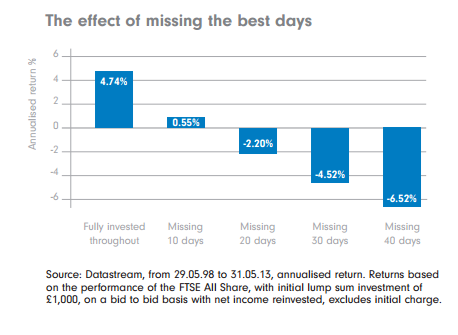With share prices tumbling across Europe, US and Asia, what should investors do?
Fears of a global economic slowdown and the impact of the Ebola crisis finally caught up with stock markets this last week. The UK's FTSE 100 index fell 10%, officially reaching 'correction' territory before recovering slightly at the end of the week, European stock markets had their longest rout since 2003 and the US's S&P 500 erased all the profits it has made this year.
Investors have cause to panic, but should they? Despite predictions of further stock market losses to come, long term investors are being urged to stay invested.
Billions of pounds, euros and dollars down the drain
Stock markets around the world experienced sharp slides this week in what has been described as the perfect storm. A raft of economic data from China, Europe and the USA started the rout and when combined with the US Federal Reserve stopping the money printing presses this month and increasing fears of deflation, losses mounted as the week went on.
Investor confidence has been hammered and the Ebola crisis and ongoing geo-political issues in the Ukraine has caused a very jittery environment for investors and drained confidence from markets.
For an investor, this looks like a recurring nightmare, getting up each morning and wondering what happened the night before as each stock market index takes it in turn to slide.
Perfect timing
But whilst many investors panic and sell their shares, it's better to stay invested according to history.
Determining the perfect time to buy and sell investments is almost as difficult as winning the lottery. Timing the market is definitely not your best investment strategy, despite what your instincts may be telling you. A buy and hold strategy is recommended by some of the world's most skilfull investors including Warren Buffett.
Need proof?
The massive US fund house, Fidelity Investments has some re-assuring and surprising conclusions after looking at stock market history. The more you try to time the markets, the more likely you are to end up with terrible investment returns. For example, staying invested through all of the stock market turmoil of the last 15 years and you would have generated annual returns of 4.74%. Try and time the market through buying and selling stocks, in the hope of missing the bad days and chances are you would end being a loser, in most cases a BIG loser!
The Fidelity statistics show that missing the 10 best days, in the 15 year period, would mean your annual investment returns would have dropped to just 0.55% per year. Missing the best 20, 30 and 40 days can mean you really ruin your financial health (wealth) because by not being invested and trying to time the market, you would have lost money and had staggering negative returns of -2.20%, -4.52% and -6.52% each year, respectively.

So the best financial advice you can remind yourself of is, it's "Time in the Market, Not Market Timing" that matters. Trying to time the markets is a fools game and will inevitably just lead to large losses.
Thinking of investing?
If you haven't invested yet and just can't bring yourself to invest your lump sum of hard earned cash in one go as the stock markets continue to fall, you could try investing using the pound, or dollar cost averaging method. Designed for the regular saver or nervous investor, investing each month on a regular schedule, regardless of stock market prices and how you are feeling makes for a sound investment strategy. By investing this way, it can actually reduce the risk of you investing a big amount in one go at the wrong time. By buying shares as they rise and fall, market timing is no longer an issue, which leaves you investing for just time in the market, the most sensible investment strategy for any long term private investor to adopt.
With the sell off in global stock markets looking set to continue and further market swings expected over the next few days or weeks, look at investment history and take comfort that doing nothing is probably the best investment decision you can make!
